Monday, June 12, 2017
Roy Willis did not talk much about himself during his retirement farewell speeches in April 2017 at the National Propane Gas Association (NPGA) Southeastern Convention and the Propane Education & Research Council (PERC) meeting. Instead, the outgoing PERC president and CEO directed most of his comments at the history of the council and how it has progressed since it was founded in 1996. But he did speak briefly about his personal journey, starting from his early career and continuing to PERC’s early days after he joined the council in 1998. He recalled the beginning of his career just after he was discharged from the U.S. Navy, when he took up undergraduate studies in communications. 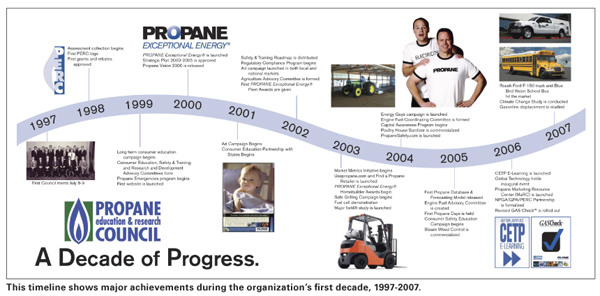
“My dad asked me, ‘Can you make a living doing that?’ He was a truck driver. His attitude was, if you get an education, it better teach you how to make a buck,” Willis said. His father shouldn’t have worried. The younger Willis went on to lead his own communications firm and oversaw communications efforts for political campaigns. “I’ve been curious about communications all my career, and to see what we’ve been able to do at PERC in communications has been very gratifying.”
As he eyed his upcoming retirement, Willis told BPN he began his duties at the helm of PERC with the hope the organization’s achievements would exceed expectations, “not only my own but the industry’s as well. I believe this has been the case, and I hope the industry sees it that way as well, not that there haven’t been challenges.” He will have some contractual obligations to the council through the next year, including assisting in the search for a new PERC chief executive to replace him and acting in a consulting role. Willis added that the CEO search is nearly complete, and that an announcement should be forthcoming within days or weeks.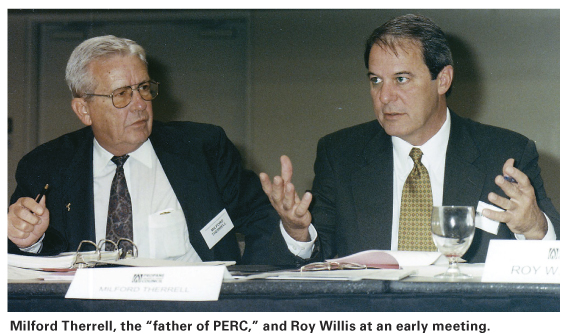
“I also have some personal projects. I’ve been a painter for many years, but I have frequently had to put it aside and I haven’t given it the attention it deserves. I do landscapes and cityscapes, and look forward to exploring portraiture. I’ll be trying to pull those interests together now that I will have more time to concentrate.” He observed that it’s “frustrating to aspire to be good,” but at the same time, by not devoting the hours of practice needed to improve, “you’ll never get there.”
Willis said he and his wife would commence their search for a new home in Florida. “My daughter lives in Gainesville, and we would like to live in St. Augustine or suburban Orlando. It’s interesting territory. We’re on the hunt, now that my successor has been named to devote full-time energy to that decision.”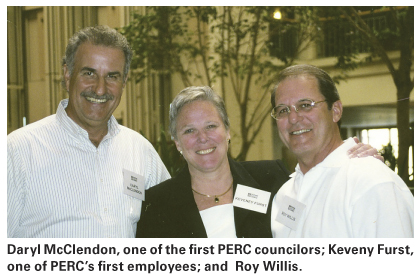
At the PERC meeting on April 19, the day before the Southeastern event, Willis recounted his first council meeting nearly 20 years ago, when he was “the youngest guy in the room.” But then he took those attending through the PERC journey — from the beginning through the many council highlights over the past two decades. He noted that the council began planning its role and priorities at its very first meeting, but just getting there was a travail. It took an exhausting four years-plus to launch PERC from the idea for a propane checkoff program, then getting the bill for its founding through Congress, and then eventually signed into law. That first meeting, therefore, “was a blank slate.”
“There were all sorts of expectations and ideas about what PERC would do, could do, and should do. For the first couple of years we were all about matching people’s expectations.” Moving on to talk about the consumer campaign featuring the Energy Guys, he noted that the number of propane-heated households grew during the campaign, especially among custom-built homes, “or as one marketer told me, ‘those are homeowners that can actually pay our bills.’” Propane captured only a 2% market share in the custom-built-home space when the PERC consumer campaign started. But the campaign grew that number to more than 7%.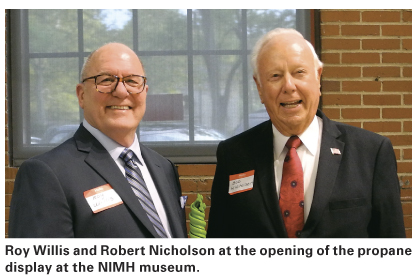
At the PERC Update presentation at the Southeastern Convention, just prior to an NPGA-hosted ceremony honoring him, Willis discussed the importance of PERC’s safety function and how it relates to the importance of council-supported training development. Of safety, Willis noted, “It’s our industry’s top priority.” He said that the idea for the Propane Emergencies program, one of the first projects PERC funded, came from a propane marketer who was also a volunteer fireman. That marketer expressed concern that fire departments did not know how to deal with propane.
“So we created this program called Propane Emergencies, which over the last 18 years has become one of the most widely used specialized training curriculums in more than half of the fire-training academies across the country. That’s an amazing accomplishment for our industry.”
He commented that more than 90% of propane companies use PERC’s safety and training programs. One of the most-used products is the Certified Employee Training Program (CETP), which has evolved over the years from notebooks, DVDs, computer-based training, and now online courses. Blended learning is the latest program, which reduces the amount of time employees must spend away from their jobs for classroom training. The program prepares participants with online resources, and then they only spend another day or two for more focused classroom instruction.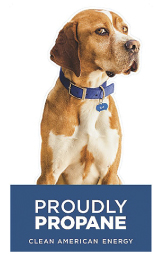
“It’s good for employees, lets them learn at their own pace, and it saves the company money because they’re spending less time away from work in classrooms. We’re thrilled at the positive feedback we’re getting on the blended learning program, and I encourage you to consider that in your own state’s or business’ training programs.”
Willis went on to cover PERC’s successes in the school bus, work truck, and forklift markets, and with its Marketer Technology and Sales Training program. “School buses are our greatest success story right now,” he said, noting that about 12,500 school buses operate in more than 700 school districts around the country, with almost three quarters of a million students traveling to or from school on a propane-fueled school bus every day. All three major school bus manufacturers now offer a propane version. He added manufacturers and school districts are working to position school buses to receive money from the Volkswagen emissions settlement case.
Willis highlighted the success of the propane mowing sector, outlining that “15,000 of these propane-powered units are in the market today. Every major manufacturer of this type of equipment offers propane equipment.
But the really good news—the early adopters who five to seven years ago bought their first propane mower are coming back every buying cycle, buying more and more propane mowers. We’re seeing momentum beginning to build in this space.”
He reviewed that after more than seven years of restriction on the council’s consumer education activities, and the restriction ended in 2015, the council accelerated its consumer education efforts. The current campaign featuring Blue the Dog has had a positive impact. Willis showed a recent television commercial featuring Blue and stated that after the ads had been off the air for about four months, potential customers’ familiarity with propane dropped, according to Nielsen research.
“The intent of this campaign was to turn around that favorability number so we had positive response from consumers when they heard about propane, and hopefully [the ads] encouraged them to consider putting propane into their homes.” Willis noted the campaign created double-digit increases in propane favorability among those who saw the ads. Current users’ willingness to consider adding a propane appliance was 13 percentage points higher after seeing the TV commercials.
“It’s been a very successful campaign. We’re back on the air now and we’ll be on the air through the end of May. We’ll be measuring at that time to see where we are before making decisions on where we go next in the campaign…but thus far it’s a tool that’s already producing the results we need to encourage consumers to want to buy more and more of our fuel.”
At the PERC meeting, Willis spoke of the council’s progress in research and development after the U.S. Department of Commerce in 2009 placed a restriction on the council’s consumer education activities. The council itself was risk-averse at that time, Willis noted, adding that research and development is all about taking risk. He remembered late board member Charles Snelling asserting the propane industry must pursue a commercialization strategy to continue to have an impact on the marketplace. He noted that Snelling led the effort to bring in commercialization experts such as Stage-Gate International to assist PERC in its product development processes. Willis said PERC’s use of those Stage-Gate methods produced about 65 “unique, distinct products.” He added that those products will bring in about $1.5 billion in value to the propane industry, and he praised early adopters who take risks and use propane products when they first come to market.
Many early adopters provide testimony that promotes the use of propane products to later users. “That’s a peer talking to a peer saying, ‘I’ve taken a risk for you, and it’s working for me, and by the way, it’s cutting my emissions and saving money.’ I think that’s a winning story. So I encourage you not to give up on some of these products, whether it’s commercial mowing, irrigation, swine heating, or whatever the product may be.”
Willis added, “The early adopters are going back and buying their second and third product, so over time we’re building momentum. I encourage you…don’t give up, because you have helped create—as my old buddy Bob Myers used to say—things we can hook a hose to that did not exist 20 years ago before this council began operation, and to me, that’s a success story that belongs to all of our industry.” —Daryl Lubinsky

“My dad asked me, ‘Can you make a living doing that?’ He was a truck driver. His attitude was, if you get an education, it better teach you how to make a buck,” Willis said. His father shouldn’t have worried. The younger Willis went on to lead his own communications firm and oversaw communications efforts for political campaigns. “I’ve been curious about communications all my career, and to see what we’ve been able to do at PERC in communications has been very gratifying.”
As he eyed his upcoming retirement, Willis told BPN he began his duties at the helm of PERC with the hope the organization’s achievements would exceed expectations, “not only my own but the industry’s as well. I believe this has been the case, and I hope the industry sees it that way as well, not that there haven’t been challenges.” He will have some contractual obligations to the council through the next year, including assisting in the search for a new PERC chief executive to replace him and acting in a consulting role. Willis added that the CEO search is nearly complete, and that an announcement should be forthcoming within days or weeks.

“I also have some personal projects. I’ve been a painter for many years, but I have frequently had to put it aside and I haven’t given it the attention it deserves. I do landscapes and cityscapes, and look forward to exploring portraiture. I’ll be trying to pull those interests together now that I will have more time to concentrate.” He observed that it’s “frustrating to aspire to be good,” but at the same time, by not devoting the hours of practice needed to improve, “you’ll never get there.”
Willis said he and his wife would commence their search for a new home in Florida. “My daughter lives in Gainesville, and we would like to live in St. Augustine or suburban Orlando. It’s interesting territory. We’re on the hunt, now that my successor has been named to devote full-time energy to that decision.”

At the PERC meeting on April 19, the day before the Southeastern event, Willis recounted his first council meeting nearly 20 years ago, when he was “the youngest guy in the room.” But then he took those attending through the PERC journey — from the beginning through the many council highlights over the past two decades. He noted that the council began planning its role and priorities at its very first meeting, but just getting there was a travail. It took an exhausting four years-plus to launch PERC from the idea for a propane checkoff program, then getting the bill for its founding through Congress, and then eventually signed into law. That first meeting, therefore, “was a blank slate.”
“There were all sorts of expectations and ideas about what PERC would do, could do, and should do. For the first couple of years we were all about matching people’s expectations.” Moving on to talk about the consumer campaign featuring the Energy Guys, he noted that the number of propane-heated households grew during the campaign, especially among custom-built homes, “or as one marketer told me, ‘those are homeowners that can actually pay our bills.’” Propane captured only a 2% market share in the custom-built-home space when the PERC consumer campaign started. But the campaign grew that number to more than 7%.

At the PERC Update presentation at the Southeastern Convention, just prior to an NPGA-hosted ceremony honoring him, Willis discussed the importance of PERC’s safety function and how it relates to the importance of council-supported training development. Of safety, Willis noted, “It’s our industry’s top priority.” He said that the idea for the Propane Emergencies program, one of the first projects PERC funded, came from a propane marketer who was also a volunteer fireman. That marketer expressed concern that fire departments did not know how to deal with propane.
“So we created this program called Propane Emergencies, which over the last 18 years has become one of the most widely used specialized training curriculums in more than half of the fire-training academies across the country. That’s an amazing accomplishment for our industry.”
He commented that more than 90% of propane companies use PERC’s safety and training programs. One of the most-used products is the Certified Employee Training Program (CETP), which has evolved over the years from notebooks, DVDs, computer-based training, and now online courses. Blended learning is the latest program, which reduces the amount of time employees must spend away from their jobs for classroom training. The program prepares participants with online resources, and then they only spend another day or two for more focused classroom instruction.

“It’s good for employees, lets them learn at their own pace, and it saves the company money because they’re spending less time away from work in classrooms. We’re thrilled at the positive feedback we’re getting on the blended learning program, and I encourage you to consider that in your own state’s or business’ training programs.”
Willis went on to cover PERC’s successes in the school bus, work truck, and forklift markets, and with its Marketer Technology and Sales Training program. “School buses are our greatest success story right now,” he said, noting that about 12,500 school buses operate in more than 700 school districts around the country, with almost three quarters of a million students traveling to or from school on a propane-fueled school bus every day. All three major school bus manufacturers now offer a propane version. He added manufacturers and school districts are working to position school buses to receive money from the Volkswagen emissions settlement case.
Willis highlighted the success of the propane mowing sector, outlining that “15,000 of these propane-powered units are in the market today. Every major manufacturer of this type of equipment offers propane equipment.
But the really good news—the early adopters who five to seven years ago bought their first propane mower are coming back every buying cycle, buying more and more propane mowers. We’re seeing momentum beginning to build in this space.”
He reviewed that after more than seven years of restriction on the council’s consumer education activities, and the restriction ended in 2015, the council accelerated its consumer education efforts. The current campaign featuring Blue the Dog has had a positive impact. Willis showed a recent television commercial featuring Blue and stated that after the ads had been off the air for about four months, potential customers’ familiarity with propane dropped, according to Nielsen research.
“The intent of this campaign was to turn around that favorability number so we had positive response from consumers when they heard about propane, and hopefully [the ads] encouraged them to consider putting propane into their homes.” Willis noted the campaign created double-digit increases in propane favorability among those who saw the ads. Current users’ willingness to consider adding a propane appliance was 13 percentage points higher after seeing the TV commercials.
“It’s been a very successful campaign. We’re back on the air now and we’ll be on the air through the end of May. We’ll be measuring at that time to see where we are before making decisions on where we go next in the campaign…but thus far it’s a tool that’s already producing the results we need to encourage consumers to want to buy more and more of our fuel.”
At the PERC meeting, Willis spoke of the council’s progress in research and development after the U.S. Department of Commerce in 2009 placed a restriction on the council’s consumer education activities. The council itself was risk-averse at that time, Willis noted, adding that research and development is all about taking risk. He remembered late board member Charles Snelling asserting the propane industry must pursue a commercialization strategy to continue to have an impact on the marketplace. He noted that Snelling led the effort to bring in commercialization experts such as Stage-Gate International to assist PERC in its product development processes. Willis said PERC’s use of those Stage-Gate methods produced about 65 “unique, distinct products.” He added that those products will bring in about $1.5 billion in value to the propane industry, and he praised early adopters who take risks and use propane products when they first come to market.
Many early adopters provide testimony that promotes the use of propane products to later users. “That’s a peer talking to a peer saying, ‘I’ve taken a risk for you, and it’s working for me, and by the way, it’s cutting my emissions and saving money.’ I think that’s a winning story. So I encourage you not to give up on some of these products, whether it’s commercial mowing, irrigation, swine heating, or whatever the product may be.”
Willis added, “The early adopters are going back and buying their second and third product, so over time we’re building momentum. I encourage you…don’t give up, because you have helped create—as my old buddy Bob Myers used to say—things we can hook a hose to that did not exist 20 years ago before this council began operation, and to me, that’s a success story that belongs to all of our industry.” —Daryl Lubinsky

